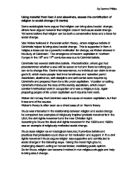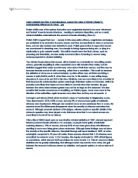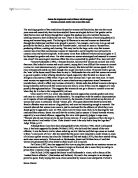Examine the factors affecting the domestic division of labour and power relations between couples.
Examine the factors affecting the domestic division of labour and power relations between couples. Domestic division of labour is the division of tasks, roles and duties, within the household. With the increased entry of married women into formal employment, sociologists began to look more closely at the processes that linked home and workplace, including the question of whether or not women's increased involvement in paid labour led to a renegotiation of the traditional domestic roles and organization of domestic labour. A major characteristic of the symmetrical family outlined by Young and Willmott was the degree to which spouses shared domestic work and leisure activities. In Young and Willmott's stage 2 family, conjugal roles were largely segregated. There was a clear cut division of labour between spouses in the household and the husband was relatively uninvolved with domestic chores and raising the children. The wife is associated mainly with her female kin and neighbours and the husband with his male workmates, kin and neighbours. In the stage 3 symmetrical families, conjugal roles become joint, however the wife still has primary responsibility for housework and child rearing, husbands become more involved, often washing clothes, ironing and sharing other domestic duties. Husband and wife shared responsibility for decisions that affect the family; they discuss matters
Using material from item A and elsewhere, assess the contribution of functionalism to our understanding of families and households
Examining the Functions of the Family . Explain what is meant by consensus? Consensus is an agreement among a majority of members of society that something is good and worthwhile, it’s a set of shared norms and values, into which society socialises it’s members . Identify the two essential functions that Parsons sees the nuclear family as performing? Using material from item A and elsewhere, assess the contribution of functionalism to our understanding of families and households? Functionalists believe that society is based on a value consensus; this is a set of shared norms and values into which society socialises its members. This enables society to work harmoniously and meet its needs and goals. Functionalists view society as being made up of a number of sub-systems that are dependent upon each other. These can include the education system, media, religion, and the economy. Just as the human body is dependent upon each of the functions in order to survive, society is dependent on each of the sub-systems. The family meets some of society’s essential needs by socialising children. This is regarded as a basic building block of society. Murdock argues that the family performs four essential functions to meet the needs of society and its members. These include; stable satisfaction of the sex drive, reproduction of the next generation, socialisation of the young
Comparison Of Marxist And Functionalist Views On Education
Comparison Of Marxist And Functionalist Perspectives On Education Education is important in society; the structure and processes of education systems are related to the general process of socialization. All sociologists agree with this statement, but different sociologists have many views about how societies are structured, they have different views about the role of education in society. The Marxist perspective tries to explain everything about an area it has identified, such as education. It tries to look for correlation in certain field of data, to explain and understand the reasons for how things are how they are. A Marxist perspective on school would state that it was constructed and built upon the principle of a hierarchy. Hierarchy is a key idea in Marxism, as it is a structuralist perspective. The teachers are seen as in charge and the students follow any instructions put by teachers. Marxist views would also state that education is a system of social inequality, meaning that not everyone passes, schools justify this by saying that the inequality it produces is just and reasonable, and the students who have received high grades deserve them. The Functionalist perspective looks at Education as a type of sorting station in which students undergo thorough training and testing so that they are given their appropriate place in society, this all depends on how well they
Assess the sociological views of the relationship between the family and industrialisation
Assess the sociological views of the relationship between the family and industrialisation Most sociological debates of family diversity have centred around three questions. Firstly, is the nuclear family universal, Secondly, is the nuclear group the only one that can carry out the vital functions of the family, and thirdly what is the link between the nuclear family structure and industrial society, did the nuclear family break away from this extended family system as a result of industrialization? The relationship between family structure and industrialisation remains a popular question, as it is linking the family with social change. ‘Pre Industrialisation’ refers back to the society before industrialisation, it was largely agricultural and work was centred at the home, people were given ascribed occupational roles this was known as the domestic industry. Family during the time was extended commonly and played a major role in looking after dependent children and had main responsibility for health and welfare of the young, and those of old age who couldn’t work. Before the compulsory education act in 1880, the family performed the acts of primary and secondary socialisation. Working class families had high illiteracy rates. However, during the Industrial revolution the nuclear family became more dominant in society. ‘Industrialism’ refers to the mass production
Assess the contribution of functionalism to our understanding of society
Assess the contribution of functionalism to our understanding of society Charlotte McCaffrey Functionalism is a consensus theory. It sees society as based on agreement among people about values, goals and rules in society. The job of the family is primary socialization. The family introduces norms and values to children, who carry these on to later years, where they are reinforced by religion and education. These norms and values allow people to move up the social hierarchy. For example, children are taught to conform by the family and education, which allows them to conform to the rules of wider society and become aware of what, is socially acceptable. Education also trains by teaching the skills needed for later life, for example punctuality, and interview skills. Unlike conflict structuralism, functionalists believe that society is based on merit, and those who work the hardest will be the ones to make it to the top, ensuring jobs are filled by those most capable, with the required skills. Those who don't work, will stay at the bottom of the hierarchy, and carry out the more menial, but equally essential jobs. Many of the key ideas of functionalism can be traced back to Emile Durkheim, However it was American sociologist Talcott Parsons, who developed functionalism as a systematic theory of society in the middle of the 20th Century. Functionalism is a macro
Evaluate the Contribution Marxists Have made in Understanding the Role religion plays in Society
Evaluate the Contribution Marxists Have made in Understanding the Role religion plays in Society Marxists claim that religions play a conservative role in society, meaning it promotes a ruling class ideology to keep the working classes in check and maintain the status quo. They see religion as a human made concept, arguing it acts as an 'opiate for the masses' blinding them to the true nature of a capitalist society, 'it is easier for a camel to pass through the eye of a needle than a rich man to enter the kingdom of heaven' - a common nineteenth century notion justifying social inequality by saying existing hierarchy is 'god given' Marx sees religion as a tool for social control, keeping the working classes at bay and working solely in the interest of the ruling classes. These is much evidence to support this, Halevy 1972 commented on how the Methodist religion played an integral role of preventing a working class revolution in the 19 century, encouraging people to seek enlightenment spiritually rather than revolt against the capitalist who were oppressing them, like most other European countries did at some point in history. Marx comments on religion disguising the true nature of exploitation, they see religion as a means to justify economic and social inequality in supernatural terms. Marxist theory on religion, like all sociological theories, can be highly criticized.
Assess the functionalist view that religion benefits both society as a whole and its individual members.
5. 'Assess the functionalist view that religion benefits both society as a whole and its individual member. (18)' Functions have put forward their perspective on religion and how it benefits both society and the individual starting with how religion brings people together and creates social cohesion, which makes you feel like you belong in society as well as being apart of something which is much greater than yourself. While conforming to religious beliefs this allows us to gain morals, as well as giving us a variety of cultures allowing us to tolerate and accept different religions. Functionalists see religion as a positive aspect to society. Durkheim explains that religion makes a great contribution to society giving us social integration, and the source of social solidarity. His view on sacred symbols represents society's collective consciousness which is the shared norms, values beliefs and knowledge that make social life possible without such consciousness it would crumble. While participating in shares rituals binds individuals together reminding them that they are a part of a community which they owe loyalty. The power of society came from these rituals and without them they are nothing, to which they owe everything. The individual see's religion performing a significant function allowing them to feel apart of society and seeing that religion strengthens us to face
Using material from item A and elsewhere, assess the contribution of religion to social change (18 marks)
Using material from item A and elsewhere, assess the contribution of religion to social change (18 marks) Some sociologists have argued that religion can bring about social change; others have argued however that religion does in fact cause social change. Yet some believe that religion can be both a conservative force and a force for social change. Max Weber believed in the social action theory, where religious beliefs of Calvinists helped to bring about social change. This is supported in item A 'religious ideas can be a powerful motivation for change, as Weber showed in his study of Calvinism.' The emergence of modern capitalism in Northern Europe in the 16th and 17th centuries was due to Calvinist beliefs. Calvinists had several distinctive beliefs. Predestination, where god had predetermined whether a soul will be saved or not and there is nothing you can do to change this. Devine transcendence, no individual can claim to know god's ill, which made people feel inner loneliness and 'salvation panic'. Asceticism, abstinence, self-discipline and self-denial were required by Calvinist's and prepared them for a life under capitalism. Vocation or calling, Calvinist's introduced the idea of this worldly asceticism, which meant constant methodical work in occupation and was a religious duty. Again preparing people of life under capitalism as it requires hard work. Weber did
Education is the main agent of secondary socialisation. How do schools prepare us for social life?
Education is the main agent of secondary socialisation. How do schools prepare us for social life? Whatever the view on education, it is clear that schools are one of the most important agents of secondary socialisation. Peer groups and teachers have a major impact upon the socialisation of schoolchildren. In the case of the former, such groups exert "peer pressure" which influence students to conform to various norms and values. Sociologists often see the relationship between society and education results as similar, but explain them in different ways. Socialisation is the process whereby we learn to become competent members of a group. Primary socialisation is the learning we experience from the people who raise us. On the other hand, secondary socialisation takes place mostly outside the place where we are raised. Functionalists see a relationship between education and other social institutions, and the contribution education makes to meet the functional needs of the social system as a whole; education is viewed as meritocratic whereby it is fair on everyone and the main key agents for success are intelligence and effort. Durkheim argues that education prepares young children to be able to conform to social life. By teaching the children values, norms and to obey authority and understand their role in society, education fulfils the needs of society. School can be viewed
Assess the role of the media
Assessing The Role Of The Media In society the media is, arguably, one of - if not the - most powerful of institutions however some sociologists would argue, for example Baudrillard, that its' power is diminishing or weak. The media is debated widely both assessing its' influence and functions, or in some cases dysfunctions. The media's primary function is to inform the masses which is the origin of its' overwhelming power in society because obviously through manipulating what the masses are informed of - censorship - and the altering the portrayal of parts of the news the media - propaganda - they are able to control our thoughts - ideological control. The media is associated with not only informing the public but furthermore representing the public and bringing up moral, political and social issues on behalf of the public. Also the media gives the public freedom to express and broadcast their views and opinions; take Youtube for example, Youtube allows anyone to broadcast online videos, newsfeeds and blogs it enforces freedom of speech and Youtube along with other independent media sources, such as The Independent, ITV etc. increase and extend democracy in the UK. Dahl, a pluralist would agree with this view of the media, that the media informs us, and he says that the media demonstrates thousands of millions of different views and opinions, it broadcasts many different















![Outline and evaluate the functionalist view of the role of the family in society [33 marks]](https://mbt-essays-prod-public.s3.eu-west-1.amazonaws.com/1211066/listing/1211066_1.jpg)












